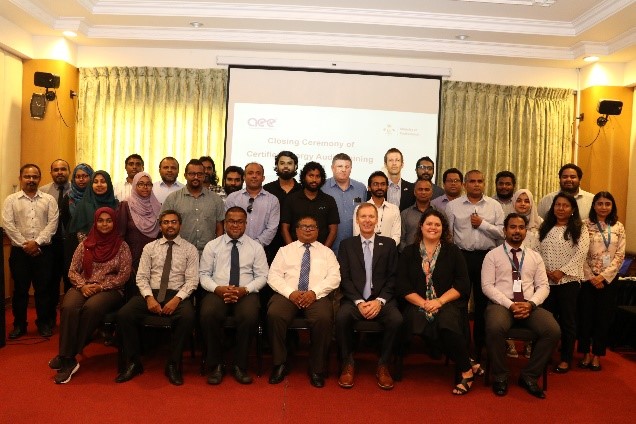Energy audit is an important tool for defining energy efficiency measures, which can be carried out at different levels. In the last several decades, energy audits have exploded as the demand to lower increasingly expensive energy costs and move towards a sustainable future have made energy audits greatly important.
The objective of an energy audit is to identify and develop modifications that will reduce the energy use and the cost of operating a building. It determines the energy consumption associated with a facility and the potential savings. Energy audits not only provide enormous benefits in areas like reducing energy costs, it also helps to reduce the dependence on foreign energy sources, reduce environmental damage and pollution & reduce damage to the environment associated with the exploitation of resources. It helps reduce the impact of greenhouse gas emissions.
To build capacity of individuals in this field in the Maldives, Certified Energy Auditor (CEA) training was conducted by the Ministry of Environment, Climate Change and Technology (MECCT) of the Maldives with support from the Association of Energy Engineer’s (AEE), under the project Strengthening Low Carbon Energy Island Strategies (LCEI). The project was funded by the Global Environment Facility (GEF) and executed by the Ministry with implementation support from UN Environment.
The Association of Energy Engineers (AEE) , USA is a non-profit professional society of over 18,000 members in more than 100 countries. The mission of AEE is “to promote the scientific and educational interests of those engaged in the energy industry and to foster action for Sustainable Development.”
AEE certification programs that are internationally accredited, such as the CEM and CEA, comply with global standards and industrial markets’ defacto requirements in over 100 countries and have been utilized by agencies and organizations to develop energy efficiency programs worldwide.
The CEA course was conducted to attain the following objectives:
- To improve the professional standards of energy auditing professionals.
- To encourage energy auditing experts to participate in a professional development programme that will improve their expertise.
- To identify people who have an adequate understanding of the concepts and practices of energy auditing by taking an exam and meeting the required performance and behaviour criteria.
- To honour energy auditing experts who have exhibited a high degree of skill and ethical fitness in their work.
The CEA Auditor course covered various topics which included developing an Energy Audit Strategy & Plan, Energy Use Analysis, Data Collection & Analysis, Economic Analysis, Lighting Systems, Heating, Ventilation & Air Conditioning Systems, Domestic Hot Water Systems, Motors and Drives & Compressed Air Systems, Building Envelope, BAS, PAS, and EMCS, Alternative Generation & Storage and Transport.

The training program was conducted from 16th February to 27th February 2020 in which 23 energy enthusiasts participated. All the participants attended a CEA preparatory training which was conducted by approved training professional of AEE and took a test proctored by the exam administrators.
AEE has awarded CEA certification to 16 participants who successfully acquired the standard qualification to become a certified energy auditor. AEE’s CEA certification will be beneficial in capacity building in developing certified energy auditors in the Maldives and identifying qualified individuals to perform a wide range of energy audits.
List accessible from: https://portal.aeecenter.org/custom/cpdirectory/index.cfm





